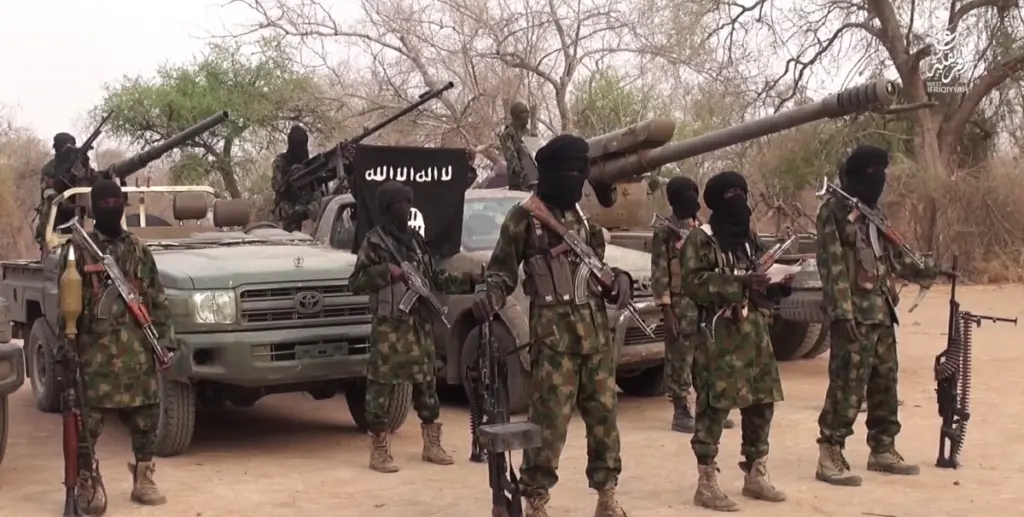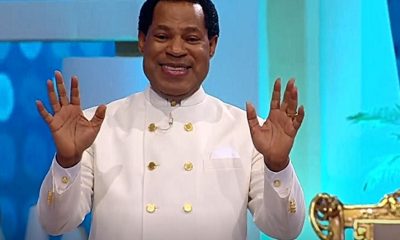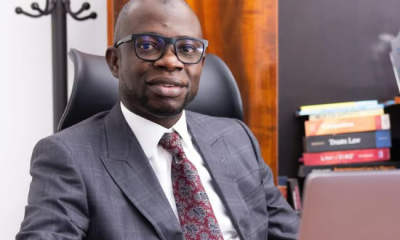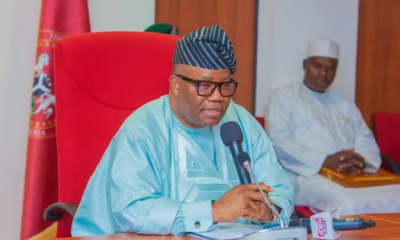Featured
Living Faith pastor recounts ordeal in hands of Boko Haram
Published
2 years agoon

Moses Oyeleke, a pastor with the Living Faith Church who had served in Chibok has recounted his ordeals in the hands of Boko Haram terrorists group who abducted him alongside a Corper and other villagers in the community where he served as a pastor on April 10, 2019.
“We had not gone far after the checkpoint before Boko Haram attacked us. The first thing we heard was gunshots. They shot at our tyres and brought our trucks to a halt.”
Afterwards, he and the corps member embarked on a “four-hour walk” to the terrorists’ base while the other driver was instructed to drive the food truck. It wasn’t quite a distance, he recalled, before they began to hear gunshots from the soldiers who were just a few meters from the scene of the attack. But they were already in the thick of the forest and the terrorists knew the area better – that was how they managed to stay out of the soldiers’ radar.
“While we were walking, we were meeting other villagers in the Boko Haram settlements. They would see us and shout ‘Allahu Akbar, happy that we were arrested. Sometimes they would give us water, sometimes they would allow us rest,” he recounted.
It was the crippling fear Oyeleke had that made him hide his identity as a pastor the following day when he was questioned. He had heard of how Christians, especially the leaders, suffered gruesome deaths at the hands of the terrorists and he did not want the same fate. His new identity was an onion farmer on his way to Gwoza to check his farms.
Later that evening, sandwiched between two heavily armed Boko Haram fighters, and a fleet of motorbikes as escorts, Oyeleke began his sojourn into Sambisa forest, the hideout of Abubakar Shekau, the leader of the group until his demise.
The forest, to the extremists, is referred to as Dar al-Islam, a dominion of Islam. To them, it is a country, and Oyeleke and his fellow captives would stay in Irasa, one of the “states”.
READ ALSO: If you inherited Boko Haram, did you inherit banditry? – Daniel Bwala asks Festus Keyamo
The uncertainty of his fate intensified when “six well-kitted soldiers, smartly dressed like our Nigerian army, with only the turbans on their heads as a distinction, arrived on bikes and inspected them, announcing that they would take him to Shekau. In between their intra-Sambisa trips, Oyeleke recalls being served, again, with “rice and beans and chicken” for dinner.
To make demands in exchange for hostages, terrorists would often make videos as proof of life of their victims. It was during one of such instances that Oyeleke suddenly felt emboldened to reveal his identity as a pastor.
“It was a voice in my head that asked me to do it,” he said. According to him, the revelation made his captors halt the recording abruptly, asking him why he did not reveal that information beforehand.
He told them he had heard “what they do when they catch pastors” and that was why he claimed to be a farmer, but he had decided to “come clean”. If Oyeleke had known that the revelation would elevate his status among the terrorists, he would have confessed earlier.
“From that day to the day I left, it was a different kind of treatment from them. They started seeing me in a new light and even started calling me ‘Baba Pastor’. Although they probably didn’t want me to notice immediately because they said they would keep me with them until their religion tells them what to do with me. That created another level of fear,” the pastor said.
Upon learning of his new identity, they took him to where he would “sleep, wake up, eat, and not shave his beard” for the next seven months. Oyeleke said the houses occupied by the terrorists were made of zinc sheets, mud, and straw.
Occasionally, they would take him around the forest to look for a network so they could place calls to his church, negotiating for an initial demand of N200 million.
READ ALSO: Police rescues kidnapped pastor in Kogi
Oyeleke is sure he was able to cope with the situation because of the relationships he fostered with the sect’s members. One of which was a “friendship” with one of the leaders, a man he identified as “Commander Hamza”.
“We developed relationships when I was already three months old there,” he said. “They are normal human beings who have changed because of the kind of work they do. There was a particular one among them that I felt was a God-sent angel to me. His name is Commander Hamza. After negotiations were unsuccessful, he would come and tell me in Hausa not to worry, that he would tell them what to do.
“Hamza is educated and he’s the one that they take along as an English translator sometimes. I found some of them are graduates,” Oyeleke said.
Whenever he was depressed, he would send for Hamza and “he would comfort me,” saying he was working on getting him out.
His captors had promised him freedom but that promise had taken three months and Oyeleke was losing hope. Eventually, he fell sick. But treatment with “high quality imported” drugs and blood capsules quickly sprung him to his feet.
Around 1 am on November 10, 2019, the seventh month of his abduction, Oyeleke, alongside a 14-year-old girl leaving her sister behind, was woken up to “get on the bike with the terrorists and leave”.
The six-hour bike ride to the ransom exchange venue was greeted with a ceremonial meal of “rice and beans” but this time, without chicken.
Oyeleke said they waited for about nine hours before members of the Katung Foundation, an organisation that facilitated their freedom, came for their release at a place he describes as a “highway leading to Gwoza”. They were tucked away in the bush at an angle where civilians could not see from the road, but they had an eagle-eye view.
Culled from The Cable
Trending

 Inspirational1 week ago
Inspirational1 week agoPastor Chris Oyakhilome: A Healing Minister Dedicated to Enhancing Public Health

 Featured6 days ago
Featured6 days agoGov, Abiodun appoints Chess master, Onakoya sports ambassador

 Crime6 days ago
Crime6 days agoVandalism: Osun water corporation appeals to residents

 Featured6 days ago
Featured6 days agoOsun PDP chieftain, Abbas resigned from party

 Business5 days ago
Business5 days agoZenith Bank shareholders approve Holdco structure

 Editorial3 days ago
Editorial3 days agoGovernor Obaseki Increases Minimum Wage to N70,000 in Edo State

 Business2 days ago
Business2 days agoNNPC says fuel queues to be cleared by Wednesday

 Featured2 days ago
Featured2 days agoNigeria confronted with multifaceted challenges – Akpabio

